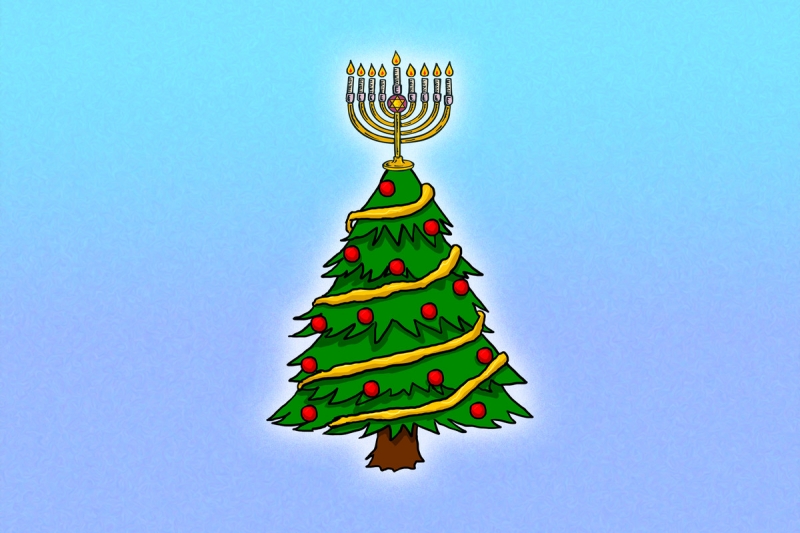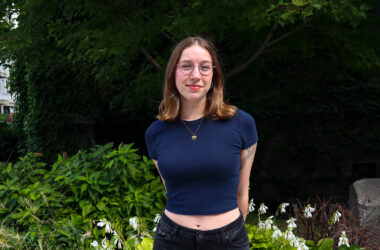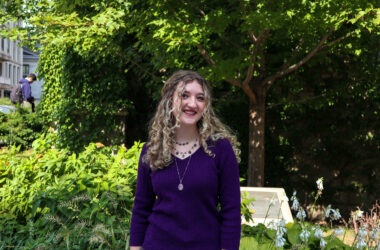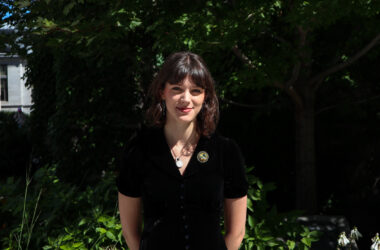Born in Queens, my mom was raised in Westchester county, New York, a predominantly-Jewish area surrounded by fellow first and second-generation Ashkenazi relatives. Meanwhile, my Arkansas-born father was growing up with Methodist parents who have deep southern roots and distant Scottish ancestry. So, when they married in 1992, a strange mixture of culture, custom, and religion was born. Part of my identity today is this jumbled—sometimes confusing—combination of that heritage.
Every September, my parents packed my brother and me, clad in cotton pyjamas, into the station wagon along with our stuffed animals. We would arrive at my maternal grandparents’ house late on Friday night and drive along the Long Island Expressway on Sunday morning to arrive at the family reunion. There, we were greeted by relatives with heavy New York accents offering bagels shmeared with cream cheese and topped with lox, capers, and red onion. My brother and I failed to escape the suffocating embraces of vaguely-familiar relatives, and, inevitably, we were forced to endure several stories that began with the phrase “Before we left Europe…” We drank sparkling apple cider and, sometimes, a sip or two of cloyingly-sweet red wine.
Family reunions in Arkansas, however, unfolded quite differently. Upon landing in Little Rock, we were met with the thick August air and the scent of dogwood blossoms. From there, we travelled to my paternal grandparents’ home in Pine Bluff and then to Hot Springs, known for its geothermal springs and tourist appeal. Much of my dad’s family does not drink alcohol for religious reasons, so we guzzled Dr. Pepper, an iconically-Southern soda. I sat at the kids’ table, occupied by many small blonde children with names like ‘Carter’ and ‘Tobin,’ and ate ham and my grandfather’s famous cornbread—which, importantly, is far less sweet than the abomination that is ‘Yankee’ cornbread—made in the whisk-scarred bowl passed down from his grandmother.
Back home in the suburbs of Boston, we lit the Shabbat candles in the dining room on Friday nights, decorated the Christmas tree, attended Hebrew school, and dropped neon-coloured tablets into vinegar and water to prepare for Easter egg-dyeing. Mezuzahs hung on door frames throughout the house, and I helped my mom grate onions and potatoes for latkes only a few weeks before attending Christmas Eve Mass and preparing a traditionally-southern New Year’s meal of collard greens and black-eyed peas.
When friends asked about my religion, I used to say that I was Jewish and Christian. Sometimes, they told me that wasn’t possible, or that I “wasn’t really Jewish.” I never knew how to respond. Judgments of my Jewishness come largely from Jews who consider themselves to be more observant than I am; however, non-Jews, too, have told me that I’m not Jewish because I no longer regularly attend synagogue. I’ve rarely seen or been a part of a community that reflects the interfaith niche in which I grew up.
In my mind, celebrating Chanukah and Christmas made me ‘both.’ While I now identify much more strongly with cultural Judaism, my experiences have always lied somewhere in the middle. I have no knowledge of the New Testament, and I can’t read Hebrew fast enough to keep up with prayers that I don’t already know. But, I also crave the crispy fried okra of the south and the tender brisket that I eat on Passover. On the morning of my brother’s Bar Mitzvah, my dad prepared a plate full of BLT sandwiches for breakfast so that we could grab something to eat as we got ready. While I wish that those around me would refrain from making their own assessments of my upbringing, and though I often feel stranded between two cultures, religions, locations, and ways of being, I have come to accept that it is okay to be both. It’s okay to eat pork before going to synagogue.







